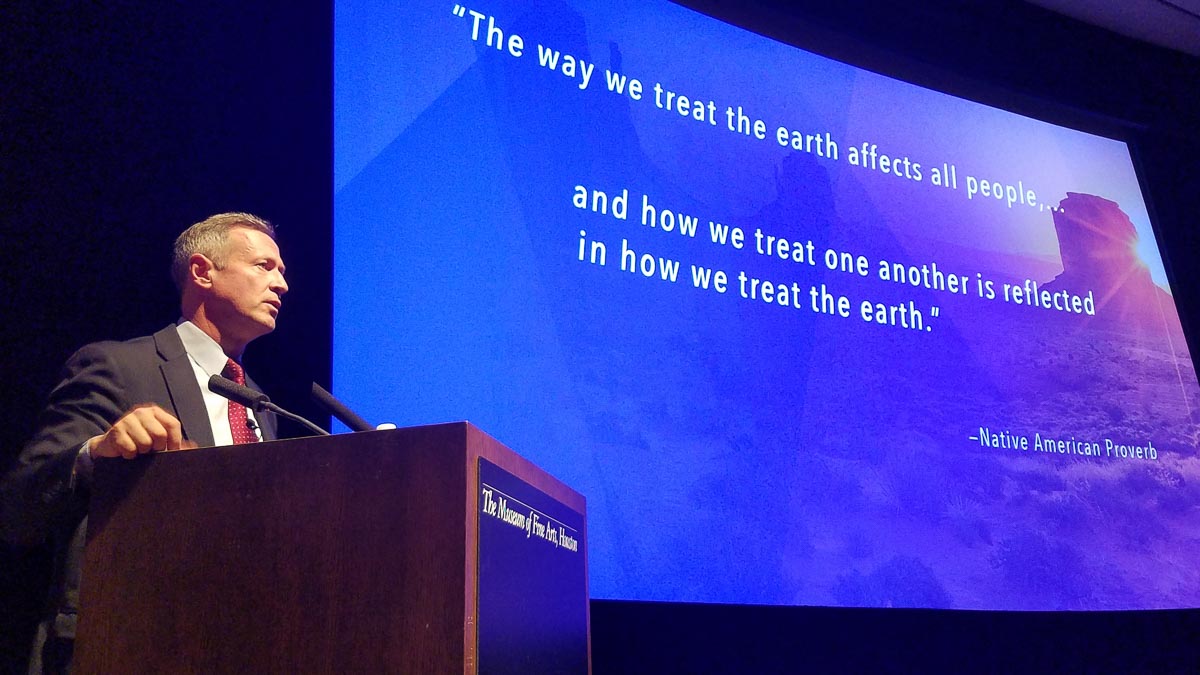In a time of "alternative facts," self-professed data wonk and former Maryland Gov. Martin O'Malley said he still believes in transparency and data as a way to improve government and foster civic participation.
O'Malley, who spoke at a Kinder Institute Forum event Wednesday, also flirted with the idea of another run for president in 2020 after a short-lived candidacy in 2016.
"I don't have anything special planned just yet," he said smiling, "but I'm keeping an open mind and an open heart."
O'Malley, who recently endorsed South Bend, Ind. Mayor Pete Buttigieg for chair of the Democratic National Committee, said he believed data-driven decision making would continue to change how elected officials govern and that mayors are leading the way.
Drawing on his experience first as mayor of Baltimore and then governor, O'Malley detailed the many data-driven efforts that began under his leadership to address everything from infant mortality and lead poisoning to illegal dumping, crime and the health of the Chesapeake Bay. His CitiStat program, and later StateStat, were considered revolutionary at the time but have since been copied across the country as cities look to become more responsive.
"Most of us love to be the best at doing something second because it's taken all the risk out," he said. But by relying on real-time information, mapping and other data, O'Malley said he was able to shift the culture of government.
O'Malley appearance remarks coincided with the debut of the Kinder Institute's new Urban Data Platform, a cross-disciplinary effort to share hundreds of datasets pertaining to demographics, public health, education and other sectors across metro Houston.
O'Malley hailed many successes of his data-focused mayoral administration: potholes filled in 48 hours or less, a reduction in violent crime, the highest levels of lead poisoning decreased by 90 percent. But he also noted that it took constant follow-up to maintain the evidence-based systems he put in place and that not all of his achievements have lived on. Notably, Baltimore had its second deadliest year in 2016 on a per capita basis with a murder rate that made it "among the deadliest cities not only in the country, but in the world," according to the Baltimore Sun.
And his hot-spot approach to policing that he credited in part for bringing down the murder rate under his tenure, has drawn criticism, particularly after the death of Freddie Gray, who died from a spinal injury while in police custody in Baltimore. Though the death happened after O'Malley's time as mayor, his policing strategies were criticized as weakening trust between communities and police. O'Malley took up the issue again Wednesday noting that "there was never a day" his administration didn't also think about policing police.
In keeping with his data-driven approach, he said, his administration posted complaints against police as well as information about police-involved shootings, something that cities were not required to report to the federal government at the time. O'Malley said his administration would even monitor cops by calling in descriptions of people who weren't at the location specified in the call to see how they would respond. That's how they caught a white officer planting drugs on a black man, said O'Malley. But many of those practices were not continued, he said.
"Technology is not a substitute for imagination," said O'Malley. But, he said, it will continue to transform government at every level. It's a message he champions as a senior fellow at MetroLab Network, a national network of university-city partnerships of which the Kinder Institute is a part. And it's one he could bring again to the presidential stage in 2020 -- though he insisted he had "nothing at all" planned just yet.
Listen to O'Malley's 2016 interview with the Urban Edge podcast below:

